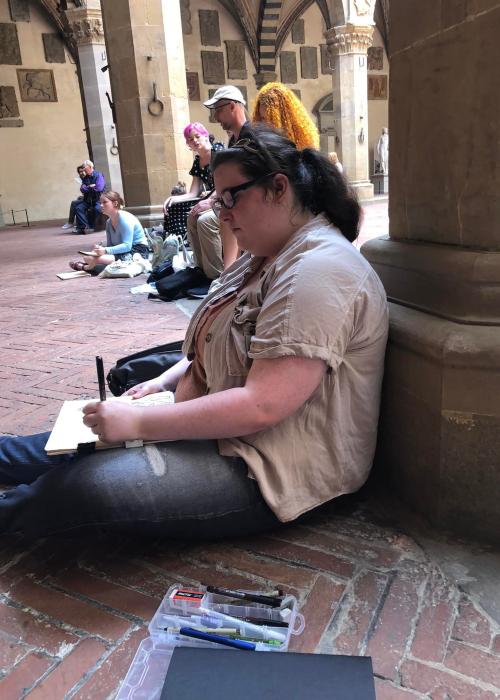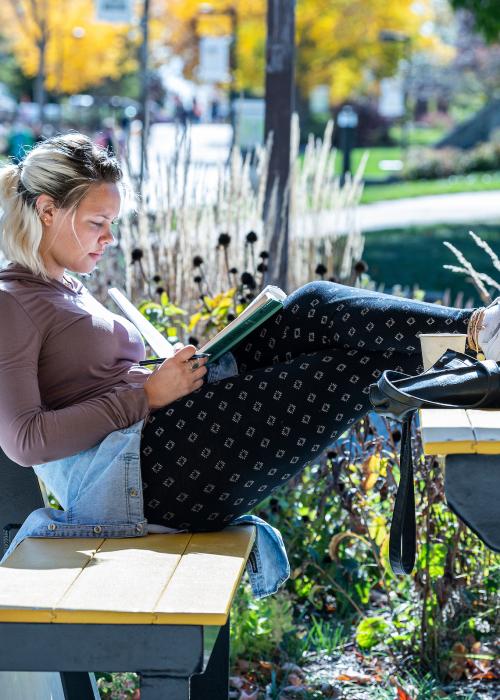
Returnees
Study Abroad Program
Welcome home.
You’ve met wonderful people, had a chance to travel, and have come to understand your own culture, your host culture, and yourself in ways you may have never imagined. Along the way there were times when you felt lonely, ran out of money, could not understand the language (even heavily accented English), and wondered why you even considered studying abroad.
The challenge now is to integrate the exhilarating and the exhausting, the miraculous and the mundane. You are back home and you probably have some ambiguous feelings about that. Don’t worry, everyone else shares them—and there’s a name for this: reentry shock.


Reentry Shock
Why does coming back feel so weird?
Coming home is a period of readjustment to your home culture and of the integration of what you’ve learned abroad. Students cope with reentry at various levels. Read more about reentry shock so that you can know what to expect.
You have become accustomed to a high level of activity and anticipation that your home and campus cannot possibly match. You may feel restless or a bit depressed for a while after you return.
Recuperate from the physical journey. Think over the ways you have changed. What did you learn about yourself? How have your family and friends reacted? Keep a journal so that you can see how your thoughts evolve over time. Talk with other returning students who may feel the same way.
You and your friends may not feel as close as you once were. You need to be sensitive about discussing your experience with them. You may also miss the friends you made overseas.
Ask about and listen to what your friends have experienced while you were away. Ask to be brought up to date on local events. Try to do new things together to get the relationship on new footing.
Your home culture may no longer be entirely to your liking, and you may have the sense that you no longer fit in. In the future, you will probably continue to evaluate ideas and events in the context of the broader cultural perspective you have acquired. Come to terms with the fact that we all tend to look past the shortcomings of our home culture when we are away and to criticize it on the basis of changed perspectives when we return. Make friends with people interested in international or intercultural affairs. Keep up with news of your host country through reading online newspapers, magazines, etc.
You may be expected to fit back into your family but find it difficult to communicate effectively because your family has not shared your experiences overseas. Your family may have difficulty adjusting to your newfound independence and changed values.
Share your experience with your family (photos, stories, etc.) and let them know how much you appreciate the opportunity they have given you to grow in new ways.
You may see your campus in a new light. You may also miss the feeling of being part of a close-knit group of students. Talk about your academic experience with your advisor, especially if you are considering new career goals. Seek out the Office of International Education to learn about meeting international students on campus. Talk with the study-abroad advisor about volunteering to spend time with students who are planning to study abroad. Seek out other students who have studied abroad. Don’t forget—you are not alone.
You have become accustomed to a high level of activity and anticipation that your home and campus cannot possibly match. You may feel restless or a bit depressed for a while after you return.
Recuperate from the physical journey. Think over the ways you have changed. What did you learn about yourself? How have your family and friends reacted? Keep a journal so that you can see how your thoughts evolve over time. Talk with other returning students who may feel the same way.
You may be expected to fit back into your family but find it difficult to communicate effectively because your family has not shared your experiences overseas. Your family may have difficulty adjusting to your newfound independence and changed values.
Share your experience with your family (photos, stories, etc.) and let them know how much you appreciate the opportunity they have given you to grow in new ways.
You and your friends may not feel as close as you once were. You need to be sensitive about discussing your experience with them. You may also miss the friends you made overseas.
Ask about and listen to what your friends have experienced while you were away. Ask to be brought up to date on local events. Try to do new things together to get the relationship on new footing.
You may see your campus in a new light. You may also miss the feeling of being part of a close-knit group of students. Talk about your academic experience with your advisor, especially if you are considering new career goals. Seek out the Office of International Education to learn about meeting international students on campus. Talk with the study-abroad advisor about volunteering to spend time with students who are planning to study abroad. Seek out other students who have studied abroad. Don’t forget—you are not alone.
Your home culture may no longer be entirely to your liking, and you may have the sense that you no longer fit in. In the future, you will probably continue to evaluate ideas and events in the context of the broader cultural perspective you have acquired. Come to terms with the fact that we all tend to look past the shortcomings of our home culture when we are away and to criticize it on the basis of changed perspectives when we return. Make friends with people interested in international or intercultural affairs. Keep up with news of your host country through reading online newspapers, magazines, etc.
Marketing Your New Skills
Don’t overlook the value of your experience.
Among the many benefits of studying abroad, your international experience will attract employers and will be an asset to your job search. You should include this experience on your résumé, and perhaps refer to it in your cover letter, portfolio, and job interviews.
Experiences in other countries offer opportunities for personal growth and exploration, as well as the opportunity to build valuable skills and traits that will enhance your ability to compete as a top job candidate. However, you need to communicate the impact and value of your experience to potential employers.
The skills and attributes gained while studying abroad are as diverse and varied as each individual’s study-abroad experience. The following list offers examples of skills often developed through living in other countries:
- Communication skills (including listening and overcoming language barriers)
- Foreign-language skills
- Global point of view, appreciation of diversity, tolerance, cultural awareness, and sensitivity to customs and cultural differences
- Flexibility and adaptability
- Motivation and initiative
- Organizational and time-management skills
- Ability to identify, set, and achieve goals
- General travel and navigational skills
- Problem-solving and crisis-management skills
- Patience
- Independence, self-reliance, and responsibility
- Perseverance
- Inquisitiveness
- Assertiveness
Ways to incorporate your experience on your résumé vary. Here are some general guidelines to help you get started:
- If you participated in a study-abroad program and attended classes abroad, you can list the experience in the education section.
- If you gained practical work experience while abroad, such as an internship, a part-time job, or practicum, you can list it in the work experience, internship experience, or career-related experience category.
- You can also include study- and work-abroad programs in a separate category called international experience or international education. This option may be the most appropriate if you’ve had multiple experiences abroad.
- Be sure to include accomplishment statements and mention the key skills you developed through these experiences.
The key to writing a great cover letter and preparing for a job interview is to match your skills and abilities to the needs of the employer.
In most cases, international experience will be attractive to employers. (You will need to determine what skills will enable you to sell yourself best.)
Use your cover letter to highlight one or two of your top skills or attributes and refer to your travel experience, if appropriate. Your cover letter should spark employers’ interest and direct them to your résumé for additional information about your qualifications.
As you get ready for job interviews, prepare stories that highlight your skill set and reflect on several experiences from your past, including studying abroad.
Contact Us
Have questions?
Contact the Study Abroad Program at [email protected], or stop by the Liberal Arts Building, Room 264, to meet with an advisor.
